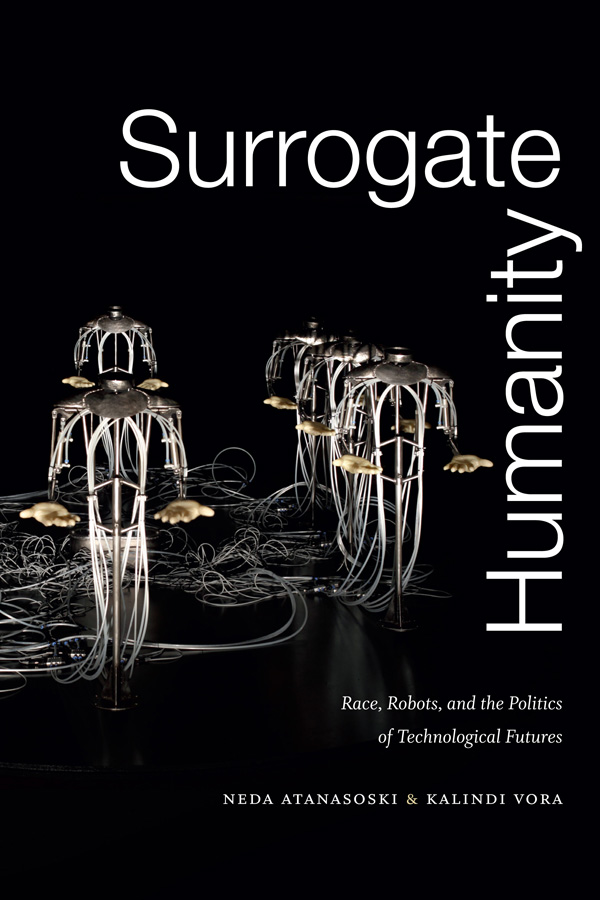Spring 2020 Speakers

Sarah Myers West
Postdoctoral Researcher, AI Now Institute
Discriminating Systems: Gender, Race and Power in Artificial Intelligence
25 FEB | 4 PM–5 PM | TSRB Auditorium
The artificial intelligence industry is in the midst of a crisis in diversity and inclusion: while the representation of women in computer science recently fell below levels in the 1960s, inclusion across lines of race, gender, and ability in AI appear to be even worse. This is reflected in biased artificial intelligence systems: voice recognition that can’t ‘hear’ women’s voices, facial identification systems that struggle to identify darker skin pigmentation and trans people, and autonomous vehicles that present safety risks to children and disabled people. This keynote will survey the landscape of gender, race and power in the field of artificial intelligence, and its implications for algorithmic injustice.
Sarah Myers West is a postdoctoral researcher at the AI Now Institute. Her research centers on the critical study of technology and culture, with an emphasis on historical and ethnographic methods. She is currently working on a project that addresses the politics of diversity and inclusion in technological communities by exploring the nexus of artificial intelligence, gender, and intersectionality. She received her doctoral degree from the Annenberg School for Communication and Journalism at the University of Southern California in 2018, where her dissertation examined the cultural history and politics of encryption technologies from the 1960s to the present day. Her work is published in academic journals such as New Media & Society, Policy & Internet, Business and Society and the Internet Policy Review.

Charlton McIlwain
Professor of Media, Culture, and Communication
Vice Provost for Faculty Engagement and Development, NYU
Dreams of (Black) Tech Futures Past
31 MAR | 4 PM–5 PM | TSRB Auditorium
This is what could have been. If the computer geeks at MIT in 1960 had just held on just a little while longer with our Mississippi freedom riders. If our uprisings in Watts, and Detroit, and Newark and Kansas City did not make us the computing revolution's first problem to solve. If we had averted the collision between civil rights and computing technology that Willard Wirtz once predicted. If we had bothered to seriously engaged Roy Wilkins' admonition to "computerize the race problem." I walk us through the alternative black technological futures that some had already begun to imagine and design more than fifty years ago. Who what and why were those futures foreclosed upon, and how did they impact our tech present? Can we still salvage our former technological dreams to imagine - and realize - a different kind of Black future?
Charlton D. McIlwain is Vice Provost of Faculty Engagement & Development at New York University, and Professor of Media, Culture, and Communication at NYU's Steinhardt School. He is also the Founder of the Center for Critical Race & Digital Studies, and the co-author of Race Appeal: How Candidates Invoke Race in U.S. Political Campaigns, winner of the 2012 APSA Ralph Bunche Award.
Latest Books
Activists, pundits, politicians, and the press frequently proclaim today’s digitally mediated racial justice activism the new civil rights movement. As Charlton D. McIlwain shows in this book, the story of racial justice movement organizing online is much longer and varied than most people know. In fact, it spans nearly five decades and involves a varied group of engineers, entrepreneurs, hobbyists, journalists, and activists. But this is a history that is virtually unknown even in our current age of Google, Facebook, Twitter, and Black Lives Matter.

Neda Atanasoski
Professor of Feminist Studies
Director, Critical Race and Ethnic Studies, UC Santa Cruz
The Speculative Futures of Robot Ethics: Killer Robots, Sex Robots, and the Limits of the Ban
28 APR | 4 PM–5 PM | Clary Theatre, Student Success Center
This talk addresses two campaigns focused on robot ethics and the politics of human futures: The Campaign Against Sex Robots and The Campaign to Stop Killer Robots. Both groups are working to ban the development of controversial categories of robots that are feared to exacerbate social inequalities, leading to increased misogyny, racism, and the degradation of human dignity and freedom. Framed as nothing less than a human rights issue, both campaigns provide speculative accounts about the technological diminishing of humanity that serve as a rallying cry for juridical action that would criminalize the development of technologies marked in and of themselves as unethical. Such an approach, I argue, remains tethered to a liberal-juridical framing of ethics and morality that rehearses post-Enlightenment versions of the human. As such, these liberal responses to technological development obscure the capitalist racialized and gendered labor and property regimes undergirding the politics of technological futures embodied in not just in the technologies they are working to ban, but also in other technologies that are central to the contemporary workings of technocapitalism. Thus, this talk also puts forth alternative approaches to the ban, looking at projects that reimageine the relationship of technology and ethics beyond law, enacting alternate humanities.
Neda Atanasoski is a Professor of Feminist Studies and Critical Race and Ethnic Studies at The University of California at Santa Cruz. She is the author of Humanitarian Violence: The U.S. Deployment of Diversity (University of Minnesota Press, 2013) and Surrogate Humanity: Race, Robots, and the Politics of Technological Futures (co-authored with Kalindi Vora, Duke University Press, 2019). She is also the co-editor of a 2017 special issue of the journal Social Identities, titled “Postsocialist Politics and the Ends of Revolution.” Atanasoski has published articles on gender and religion, nationalism and war, human rights and humanitarianism, and race and technology, which have appeared in journals such as American Quarterly, Cinema Journal, Catalyst, and The European Journal of Cultural Studies. Atanasoski is currently the co-editor of the journal Critical Ethnic Studies and the founding co-director of the Center for Racial Justice at UC Santa Cruz.
Latest Books

In Surrogate Humanity Neda Atanasoski and Kalindi Vora trace the ways in which robots, artificial intelligence, and other technologies serve as surrogates for human workers within a labor system entrenched in racial capitalism and patriarchy. Analyzing myriad technologies, from sex robots and military drones to sharing-economy platforms, Atanasoski and Vora show how liberal structures of antiblackness, settler colonialism, and patriarchy are fundamental to human---machine interactions, as well as the very definition of the human. While these new technologies and engineering projects promise a revolutionary new future, they replicate and reinforce racialized and gendered ideas about devalued work, exploitation, dispossession, and capitalist accumulation. Yet, even as engineers design robots to be more perfect versions of the human—more rational killers, more efficient workers, and tireless companions—the potential exists to develop alternative modes of engineering and technological development in ways that refuse the racial and colonial logics that maintain social hierarchies and inequality.